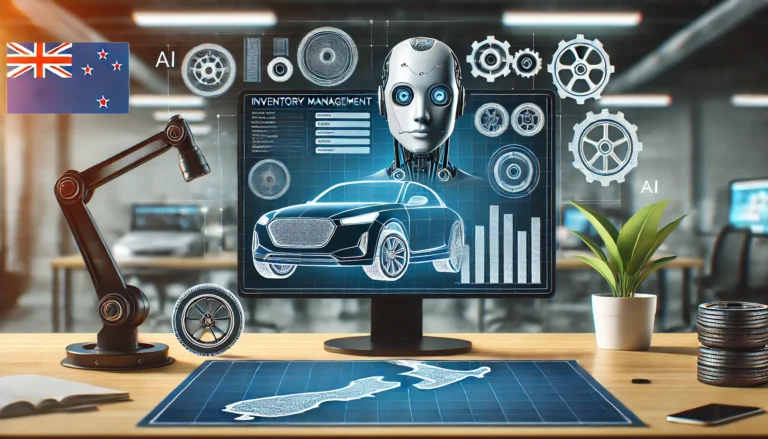Integrating AI into Car Parts Sales Software: Transforming Inventory Management, Customer Experience, and Sales Strategies

The automotive parts industry is rapidly evolving, and businesses must adapt to stay competitive. Integrating Artificial Intelligence (AI) into car parts sales software is revolutionizing the way companies manage inventory, interact with customers, and optimize sales strategies. AI-driven solutions offer immense potential for improving efficiency, enhancing customer experiences, and increasing profitability.
1. The Challenges in the Car Parts Sales Industry
The car parts industry is complex, with thousands of SKUs, fluctuating demand, and a need for quick, accurate delivery. Traditional software systems often struggle with these challenges, leading to overstock, stockouts, and suboptimal customer experiences. AI integration provides a solution by enabling smarter inventory management, personalized customer interactions, and data-driven sales strategies.
2. AI-Powered Inventory Management
One of the most significant advantages of integrating AI into car parts software is improved inventory management. AI algorithms can predict demand trends by analyzing historical sales data, market conditions, and external factors like seasonality or economic shifts. This allows businesses to maintain optimal stock levels, reduce holding costs, and avoid stockouts or overstock situations.
Key Benefits:
- Demand Forecasting: AI models predict future demand trends with high accuracy, ensuring optimal inventory levels.
- Reduced Holding Costs: Smarter inventory decisions mean less money tied up in unsold stock.
- Minimized Stockouts: By anticipating demand, businesses can avoid missing sales opportunities due to unavailable parts.
3. Enhancing Customer Experience with AI
Integrating AI in car parts sales software also enhances the customer experience by providing personalized recommendations and streamlining the purchasing process. AI-powered systems can analyze past purchases and browsing behavior to suggest the most relevant parts to customers, increasing satisfaction and conversion rates. Additionally, AI-driven chatbots can handle routine customer queries, providing instant support and freeing up human agents for more complex tasks.
Key Benefits:
- Personalized Recommendations: AI tailors suggestions based on customer history and preferences.
- 24/7 Customer Support: AI chatbots handle inquiries efficiently, improving customer satisfaction.
- Higher Conversion Rates: Targeted recommendations lead to more successful sales.
4. Optimizing Sales Strategies with AI Insights
AI provides valuable insights that help businesses optimize their sales strategies. By analyzing data such as customer demographics, buying patterns, and regional demand, AI can suggest the best pricing strategies, promotional offers, and sales channels. This data-driven approach allows companies to target the right customers with the right products at the right time, maximizing sales potential.
Key Benefits:
- Dynamic Pricing: AI algorithms adjust prices based on demand, competition, and other variables to maximize profitability.
- Targeted Marketing: AI identifies high-potential customers and tailors marketing efforts for better ROI.
- Improved Sales Forecasting: Accurate predictions help in planning sales campaigns and managing resources effectively.
5. Streamlining Supply Chain Operations with AI
In addition to inventory and sales, AI integration can streamline supply chain operations by predicting lead times, optimizing order quantities, and reducing delivery times. AI can assess factors like supplier reliability, transportation costs, and market demand to suggest the best order schedules, reducing delays and enhancing overall supply chain efficiency.
Key Benefits:
- Optimized Ordering: AI suggests the best times and quantities for ordering parts, reducing costs.
- Reduced Delivery Times: Efficient supply chain management ensures faster delivery to customers.
- Enhanced Supplier Management: AI analyzes supplier performance to improve sourcing decisions.
6. Predictive Maintenance and Inventory Turnover
AI can also be used to predict the maintenance needs of inventory items. For instance, for car parts that have a limited shelf life or require special storage conditions, AI can monitor these factors and alert managers when certain items need to be prioritized for sale or maintenance. This approach minimizes losses due to spoilage or obsolescence and maximizes inventory turnover.
Key Benefits:
- Reduced Wastage: Predictive maintenance prevents parts from becoming obsolete or unusable.
- Improved Inventory Turnover: Higher turnover rates lead to better cash flow and reduced storage costs.
- Proactive Inventory Management: Stay ahead of potential issues with real-time alerts and insights.
7. The Future of AI in Car Parts Sales Software
The integration of AI in car parts sales software is more than just a trend; it’s a strategic move towards digital transformation in the automotive industry. As AI technologies continue to evolve, we can expect even more advanced solutions that will further optimize operations, enhance customer experiences, and increase profitability for businesses in the car parts sector.
Interested in AI-Driven Car Parts Sales Solutions?
At Kiwisoft Evolution, we specialize in creating AI-powered software solutions for the automotive industry. Our AI-integrated car parts sales software is designed to optimize inventory management, enhance customer engagement, and drive sales growth. Contact us today to learn more about how we can help your business leverage AI for competitive advantage.




